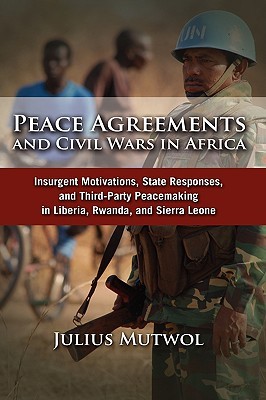
- We will send in 10–14 business days.
- Author: Julius Mutwol
- Publisher: Cambria Press
- Year: 2009
- Pages: 412
- ISBN-10: 1604975555
- ISBN-13: 9781604975550
- Format: 15.2 x 22.9 x 2.7 cm, kieti viršeliai
- Language: English
- SAVE -10% with code: EXTRA
Reviews
Description
This book answers two related questions concerning civil war peace agreements. First, it explains why some peace agreements get signed while others do not get signed, and second, why do some of those agreements that get signed not hold to ultimately bring an end to protracted civil wars. In spite of the fact that most mediated settlements of civil wars are not durable, it is still important that we understand why some civil war agreements reach initial steps towards settlement, without which full and durable end of conflict is not possible. To improve our understanding of the process through which civil war agreements are concluded and why some settlements hold while others do not, this study looks at empirical evidence from three mediated sets of peace agreements. The focus is first a series of fourteen agreements that finally ended the first civil war in Liberia in 1997; second, the 1993 Arusha peace accord that failed to prevent the escalation of conflict into genocide in Rwanda; and third, a series of three agreements that were signed but did not initially hold to end the conflict in Sierra Leone. An excellent and thorough study, this book will be a welcome reference for collections in African studies, international peace studies, and political science.
EXTRA 10 % discount with code: EXTRA
The promotion ends in 23d.11:04:25
The discount code is valid when purchasing from 10 €. Discounts do not stack.
- Author: Julius Mutwol
- Publisher: Cambria Press
- Year: 2009
- Pages: 412
- ISBN-10: 1604975555
- ISBN-13: 9781604975550
- Format: 15.2 x 22.9 x 2.7 cm, kieti viršeliai
- Language: English English
This book answers two related questions concerning civil war peace agreements. First, it explains why some peace agreements get signed while others do not get signed, and second, why do some of those agreements that get signed not hold to ultimately bring an end to protracted civil wars. In spite of the fact that most mediated settlements of civil wars are not durable, it is still important that we understand why some civil war agreements reach initial steps towards settlement, without which full and durable end of conflict is not possible. To improve our understanding of the process through which civil war agreements are concluded and why some settlements hold while others do not, this study looks at empirical evidence from three mediated sets of peace agreements. The focus is first a series of fourteen agreements that finally ended the first civil war in Liberia in 1997; second, the 1993 Arusha peace accord that failed to prevent the escalation of conflict into genocide in Rwanda; and third, a series of three agreements that were signed but did not initially hold to end the conflict in Sierra Leone. An excellent and thorough study, this book will be a welcome reference for collections in African studies, international peace studies, and political science.


Reviews